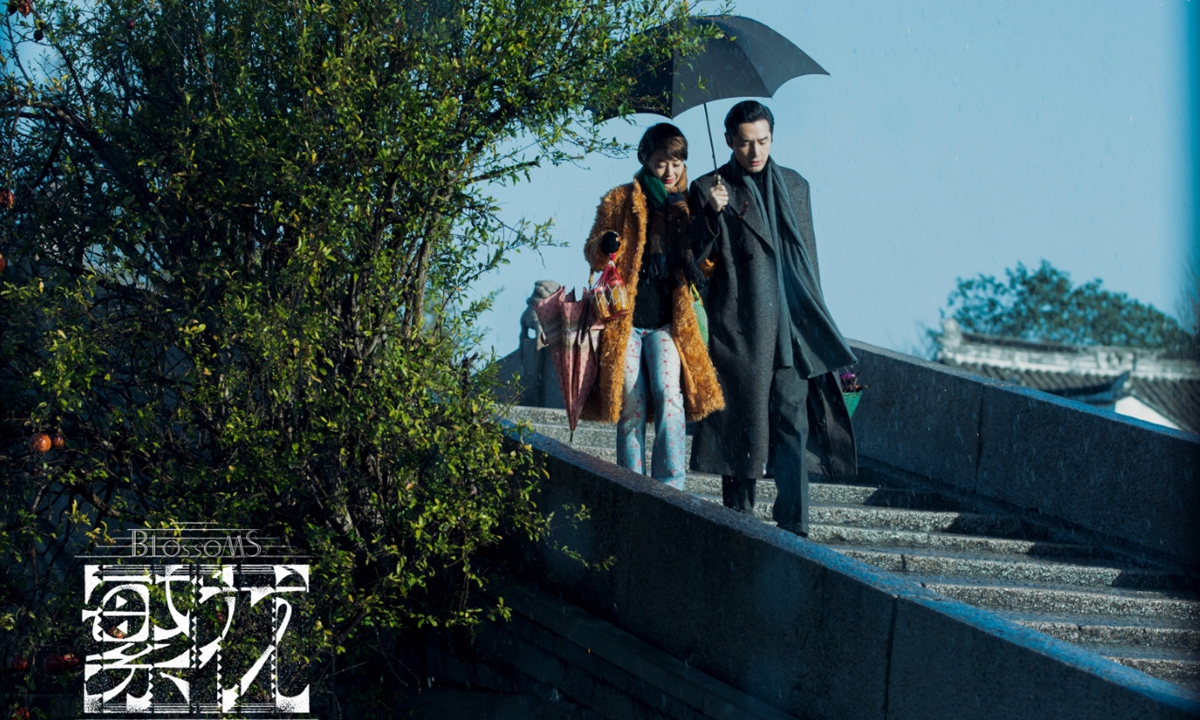
Promotional material for Blossoms Shanghai Photo: Courtesy of Douban
The TV drama
Blossoms Shanghai has sparked a peak in discussions on social media. The novel-adaption, reflecting on southern China's economic center in the 1990s, will conclude this week, but the related topics it has generated continue to ferment, giving a New Year boost to the local tourism industry in Shanghai.
Directed by Oscar nominee Wong Kar-wai, the drama, which took six years to produce, primarily shows stories of what is normally known as Haipai Culture, or Shanghai style culture, which unfolded during the 1990s. Under the Hong Kong director's guidance, the essence of the city has been captured well. The series features vibrant night scenes, cramped and noisy old houses in Shanghai, the bustling Huanghe Road with its market stalls and small eateries, and people speaking the Shanghai dialect.
Due to its distinctive style, many viewers saw shades of Wong's previous Hong Kong movies like In the Mood for Love and Days of Being Wild in the show, though the keywords for the last one are "retro," "the 1990s," and "Shanghai city." The unique visual and auditory language Wong used has aroused people's memories about the times created by this talented movie director.
But setting aside Wong's style, the drama has also ignited memories of old Shanghai for many on Chinese social media. Since the drama debuted on air on December 27, 2023, searches related to the TV series on Sina Weibo have accumulated over 3.6 billion views.
The airing of the series has directly boosted Shanghai tourism throughout the 2024 New Year. According to data from Chinese travel ticketing platform Ctrip, as of Saturday, the month-on-month search volume for Shanghai as a travel destination has grown by over 20 percent, with pre-orders for both private and group tours increasing by 75 percent and 30 percent, respectively.
Landmark buildings frequently featured in the drama, such as Huanghe Road, Fairmont Peace Hotel and the Cathay Cinema have captured the attention of book enthusiasts and viewers alike. The former street was once one of the most famous food streets in Shanghai. It emerged in the early 1990s, and gradually faded out of residents' life as locals moved to new communities away from the Huanghe Road as the city developed. But now, the area is attracting more tourists than ever, with one of the local restaurants, Tai Sheng Yuan, which also inspired a restaurant in the series, gaining newfound popularity due to the series.
At the Fairmont Peace Hotel, Ctrip shows that its British Blossoms suite has been fully booked for Saturday and Sunday.
Many have also sensed opportunities in other businesses, as Shanghai citywalk routes related to landmarks appearing in the drama are being offered on social media such as Xiaohongshu, allowing tourists to see places like Huanghe Road and Fairmont Peace Hotel. These packages include Putonghua (Standard Chinese) and Shanghai dialect explanations, with prices starting from 520 yuan ($73) for a roughly 3-kilometer route.
Business insiders say that the combination of regional cultural tourism and top-notch television series can be a highly successful two-way street.
"First, the cinematic appeal brought by director Wong Kar-wai and the fandom effect from the original novel create a strong allure," Zhang Peng, a film researcher at Nanjing University's National Research Center of Cultural Industries, told the Global Times on Monday.
"The charm of director Wong himself and the inherent quality of the content have given rise to a 'director-IP effect.' Many fans have found the cinematic essence reminiscent of Wong's acclaimed movies within this TV series."
"The original book
Blossoms Shanghai is also highly regarded in literary circles, providing a solid textual foundation for the script adaptation with its distinct characters, substantive content and smooth narrative," added Zhang.
But more importantly, this drama, centered on urban life in Shanghai, has a broad audience base. For the Yangtze River Delta, one of the most economically developed regions in China, the Shanghai theme and urban scenes have a geographical proximity and linguistic affinity, serving as a kind of identity label for the region. The use of the Shanghai dialect in particular strengthens the regional characteristics, enhancing the sense of identification and immersion, according to Zhang.
A good TV series can reflect the cultural heritage of a city.
Blossoms Shanghai is not the first Chinese TV series to promote such urban cultural tourism.
In 2021, Chinese ancient costume drama Luoyang showed a distinctive style of Luoyang in Central China's Henan Province. Local traditional features such as the Longmen Grottoes, Luoyang Peonies, and Luoyang Water Banquet were fully displayed in the drama, showing off the city and promoting the development of local tourism as well.
"Following the broadcast of a drama, various follow-up activities and check-ins will to some extent facilitate the integration and development of cultural and tourism consumption with the film and television industry," Zhang said.




